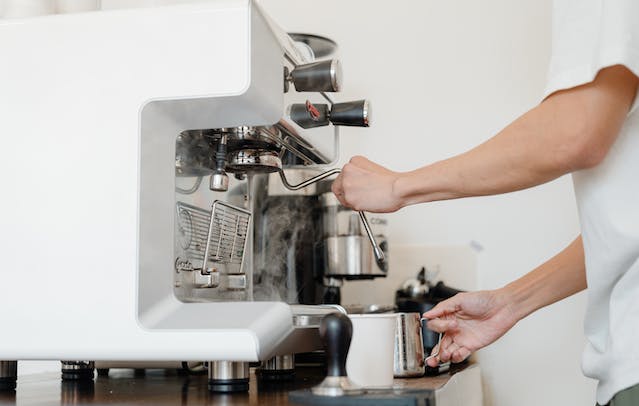How does espresso affect your stomach’s acidity?

For most coffee lovers, there is nothing quite as exhilarating as a perfect cup of rich, creamy espresso. However, if you are one of those individuals who suffer from digestive problems, you may be wondering whether your love for coffee is making your symptoms worse.
This is a common question, as coffee, including espresso, has been known to cause stomach acidity and heartburn in some people. In this post, we will discuss how espresso affects your stomach’s acidity and what you can do to minimize the impact of this popular beverage.
The acidity of espresso can have both positive and negative effects on our health. On the one hand, it can provide us with a much-needed energy boost, enhance our focus, and even improve our cognitive function. On the other hand, too much acidity can lead to discomfort, especially for those with a sensitive digestive system.
Espresso beans have a higher acidity content than regular coffee beans. Due to the preparation method, espresso has a lower pH value than regular coffee. While pH values may sound technical, they are essential to understanding the acidity differences between espresso and regular coffee. Acidity can be described as the level of sourness in a liquid, and a low pH value typically means a high level of acidity. It’s also worth noting that the way coffee is brewed or processed can affect acidity levels.
For individuals who are sensitive to caffeine, the acidity levels in espresso can hurt their digestive health. Caffeine is a known trigger for acid reflux, which can cause heartburn, acid reflux, and other related symptoms. The higher the acidity, the more caffeine is needed to achieve the desired effect, so it’s important to keep this factor in mind when consuming coffee, especially espresso.
It’s not just caffeine that has an impact on stomach acidity; other factors such as diet, stress, and lifestyle choices also play a critical role. If you are prone to digestive discomfort, it’s important to consider these factors alongside your coffee intake. Eating a clean, whole-food diet, drinking plenty of water, and engaging in regular exercise can help minimize the impact of espresso on your stomach acidity.
If you are someone who loves the taste of espresso but struggles with stomach acidity, there are several things you can do to mitigate the effects. One solution is to opt for an espresso that has been roasted to lower acidity levels. Many specialty coffee roasters now offer craft espresso blends that have been precisely roasted to reduce acidity and improve flavor. Another solution is to drink espresso in moderation. Limiting your intake to one or two cups per day can help you enjoy the benefits of coffee without the negative effects.
Is espresso better for your stomach than regular coffee?

A warm cup of coffee may be the perfect way to kickstart your day, but it’s not always kind to your stomach. The acidity level in coffee can cause heartburn, indigestion, and other gastrointestinal issues, creating discomfort for coffee lovers. However, some coffee enthusiasts suggest that drinking espresso could be a better choice. But is it factual or just a myth? Here’s what science has to say about this significant issue.
What Makes Coffee Unfriendly To Your Stomach?
Despite the mouth-watering aroma and satisfying taste, drinking a cup of coffee could result in undesirable effects on your digestive system. The reasons behind this are primarily due to the compounds in coffee that elevate your stomach’s acidity levels. Coffee also triggers gastrin and other digestive hormones in the gut, which arouse acid secretion. The outcome is a stomach that produces unnecessary acid, causing acid reflux, heartburn, and other issues.
Why Does Espresso Get Recommended?
Espresso gets manufactured from a similar kind of coffee beans that traditional coffee gets made from. While the acidity concentration in espresso is better, it’s not absent. Nevertheless, drinking espresso has some potential benefits for your stomach compared to regular coffee. Espresso is less acidic when roasted as compared to coffee, so the acid concentration is lower. Further, the quick brewing method used to produce espresso extracts less acid, creating a more relaxed stomach experience. Moreover, the portion size of an espresso shot is lower than a coffee cup, making it a safer choice for those who suffer from digestive problems.
Are The Proteins Present In Espresso Less Disagreeable?
Espresso gets prepared by pumping hot steam through coffee grounds. During this process, oil is released from the beans’ surfaces, which creates a film on top of the liquid. This film contains potent substances like cafestol and kahweol, which enhance espresso’s taste and aroma. Whereas, traditional filter coffee gets filtered before it’s served, so these oils get eradicated. Moreover, these oils have anti-inflammatory characteristics and could decrease the damage caused by corrosive acid in your digestive tract.
Other Factors To Consider
The choice between espresso and regular coffee may not wholly depend on acidity. The type of coffee, preparation methods, brewing temperature, and your tolerance play a role, too. Cold brew coffee, for instance, has less acid than traditional hot brewed coffee. Further, adding milk to your coffee can neutralize the acid. Simultaneously, drinking more than two cups of coffee a day can trigger your stomach’s acidity, irrespective of its preparation method.
Can drinking espresso on an empty stomach cause stomach irritation?

Espresso is widely known as a quick pick-me-up drink, especially for coffee lovers. It’s a staple drink in many countries, and people love to start their day with it. However, there is a growing concern about drinking espresso on an empty stomach. Some people claim that drinking espresso on an empty stomach can cause stomach irritation. Is it true? Can espresso cause stomach irritation? Let’s find out!
Espresso is a concentrated form of coffee. The brewing process of the espresso is different from regular coffee because espresso is made by forcing water through finely-ground coffee beans under high pressure. The result is a small shot of highly concentrated coffee. This concentration of coffee can have a significant effect on the stomach, especially when consumed on an empty stomach. When espresso is consumed on an empty stomach, it can cause the stomach to produce more acid than it normally would, leading to stomach irritation.
Some people are more susceptible to stomach irritation than others, depending on their digestive system’s sensitivity. People with a history of acid reflux, ulcers, and gastritis are more prone to experiencing stomach irritation after drinking espresso on an empty stomach. This occurs because the concentrated coffee aggravates the stomach’s lining, causing pain and discomfort, and in some cases, nausea.
The best way to avoid stomach irritation after drinking espresso is to drink it after eating a meal or a snack. By mixing the espresso with other foods, you’re diluting the concentration and making it easier for the stomach to handle. Additionally, adding milk or cream to your espresso can help in neutralizing the acidity and reducing the chances of stomach irritation.
Another solution to avoid stomach irritation is to switch to a different type of coffee. Regular coffee, which is less concentrated than espresso, is less likely to cause stomach irritation. However, it’s important to note that not all coffee brands are created equal. Some coffee beans are more acidic than others, and switching to a low-acid coffee brand may help reduce the chances of experiencing stomach irritation.
What does espresso do to your stomach?
Espresso, like other forms of coffee, contains caffeine which can stimulate the production of stomach acid. This can lead to an upset stomach or digestive discomfort in some people.
Does coffee upset your stomach?
Yes, for some individuals, coffee can upset their stomachs due to its caffeine content and acidic nature. However, everyone’s tolerance to coffee and its effects on the stomach can vary.
How does drinking coffee on an empty stomach affect you?
Drinking coffee on an empty stomach can irritate your stomach lining and potentially lead to stomach discomfort or an upset stomach. It is generally recommended to have something to eat before consuming coffee.
What are the health benefits of espresso?
Espresso, when consumed in moderation, can offer several health benefits. It contains antioxidants that help protect against inflammation and certain diseases. It may also improve cognitive function and boost energy levels.
How does espresso differ from regular coffee?
Espresso is a concentrated form of coffee made by forcing a small amount of water through finely-ground coffee beans. It has a stronger flavor and higher caffeine content compared to regular coffee.
Does espresso upset your stomach more than coffee?
It depends on the individual. Some people may find espresso to be more irritating to their stomach due to its higher concentration of caffeine and acidity. However, others may not experience any difference between espresso and regular coffee.
What is a shot of espresso?
A shot of espresso refers to a single serving of espresso, which is typically around 1 ounce in volume. It is the base for various espresso-based drinks such as cappuccinos, lattes, and macchiatos.
Can drinking espresso cause stomach discomfort?
In some cases, drinking espresso on an empty stomach or in excessive amounts can cause stomach discomfort or indigestion due to its high caffeine and acidity levels. It is important to listen to your body and adjust your intake accordingly.
What is the difference between espresso and coffee in terms of acidity?
Espresso generally has a lower acidity level compared to regular brewed coffee. This is because espresso is brewed at a higher pressure and for a shorter duration, which extracts less acidity from the coffee beans.
Can drinking espresso make a big difference to your stomach?
For some individuals, switching to espresso from regular coffee may make a noticeable difference in terms of stomach discomfort or acidity-related issues. However, it may vary from person to person, and it is recommended to observe your tolerance and preferences.




